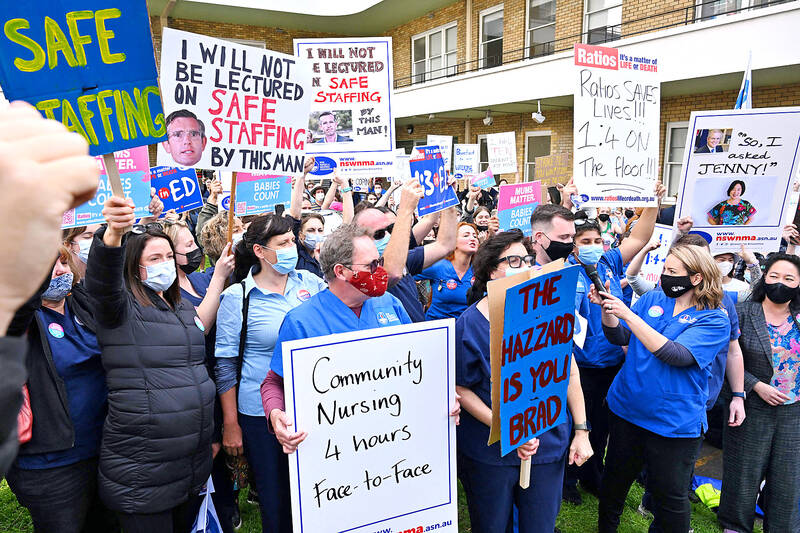Australia yesterday increased its intake of permanent migrants to 195,000 this fiscal year, up by 35,000, in a bid to help businesses and industries battling widespread staff shortages and to reduce reliance on short-term workers.
The COVID-19 pandemic closed the country’s borders for nearly two years, and along with an exodus of holiday workers and foreign students, left businesses struggling to find staff to stay afloat.
“It makes no sense to bring people in, have them for a few years, then get a new cohort in to adapt to the Australian work environment,” Australian Prime Minister Anthony Albanese said on the sidelines of a government jobs summit in Canberra.

Photo: AFP
“We want people ... to have a mortgage, to raise a family, to join the Australian family. Migration is part of our story,” he said.
The increase is to take effect for the current fiscal year ending in June next year, and is expected to bring Australia’s immigration target in line with an annual cap of 190,000 that was in place between 2013 and 2019.
That level was cut by 15 percent to 160,000 just months before the emergence of COVID-19 in a bid to ease urban congestion.
The new center-left Labor Party government convened the two-day summit, inviting business groups and unions to help find solutions to key economic challenges.
Australia’s unemployment rate is now at a near 50-year low of 3.4 percent, but labor shortages have contributed to soaring inflation that has reduced real wages.
“COVID is presenting us, on a platter, with a chance to reform our immigration system that we will never get back again. I want us to take that chance,” Australian Minister for Home Affairs Clare O’Neil told the summit.
Australia has been competing with other developed economies, such as Canada and Germany, to lure high-skilled immigrants as a surge in demand is exacerbated by an aging population.
Canada last month said it was on track to exceed its goal of granting permanent residency to more than 430,000 people this year, more than double Australia’s target, while Germany plans reforms to make itself more attractive to skilled workers.
However, a blowout in visa processing times in Australia has left about 1 million prospective workers stuck in limbo, worsening the staff shortage crisis.
“We understand that when people wait and wait, the uncertainty can become unmanageable,” Australian Minister for Immigration Andrew Giles told the summit. “This is not good enough, and reflects a visa system that has been in crisis.”
In a bid to speed up visa processing, Giles said the government plans to spend A$36.1 million (US$24.57 million) to bolster its staff capacity by 500 people for the next nine months.
Businesses welcomed the government’s efforts.
“We are in a global competition for the world’s best talent, and the more barriers we remove from the system, the more chance we will have of attracting the best people,” Australian Industry Group CEO Innes Willox said.

Intel Corp chief executive officer Lip-Bu Tan (陳立武) is expected to meet with Taiwanese suppliers next month in conjunction with the opening of the Computex Taipei trade show, supply chain sources said on Monday. The visit, the first for Tan to Taiwan since assuming his new post last month, would be aimed at enhancing Intel’s ties with suppliers in Taiwan as he attempts to help turn around the struggling US chipmaker, the sources said. Tan is to hold a banquet to celebrate Intel’s 40-year presence in Taiwan before Computex opens on May 20 and invite dozens of Taiwanese suppliers to exchange views

Application-specific integrated circuit designer Faraday Technology Corp (智原) yesterday said that although revenue this quarter would decline 30 percent from last quarter, it retained its full-year forecast of revenue growth of 100 percent. The company attributed the quarterly drop to a slowdown in customers’ production of chips using Faraday’s advanced packaging technology. The company is still confident about its revenue growth this year, given its strong “design-win” — or the projects it won to help customers design their chips, Faraday president Steve Wang (王國雍) told an online earnings conference. “The design-win this year is better than we expected. We believe we will win

Chizuko Kimura has become the first female sushi chef in the world to win a Michelin star, fulfilling a promise she made to her dying husband to continue his legacy. The 54-year-old Japanese chef regained the Michelin star her late husband, Shunei Kimura, won three years ago for their Sushi Shunei restaurant in Paris. For Shunei Kimura, the star was a dream come true. However, the joy was short-lived. He died from cancer just three months later in June 2022. He was 65. The following year, the restaurant in the heart of Montmartre lost its star rating. Chizuko Kimura insisted that the new star is still down

While China’s leaders use their economic and political might to fight US President Donald Trump’s trade war “to the end,” its army of social media soldiers are embarking on a more humorous campaign online. Trump’s tariff blitz has seen Washington and Beijing impose eye-watering duties on imports from the other, fanning a standoff between the economic superpowers that has sparked global recession fears and sent markets into a tailspin. Trump says his policy is a response to years of being “ripped off” by other countries and aims to bring manufacturing to the US, forcing companies to employ US workers. However, China’s online warriors